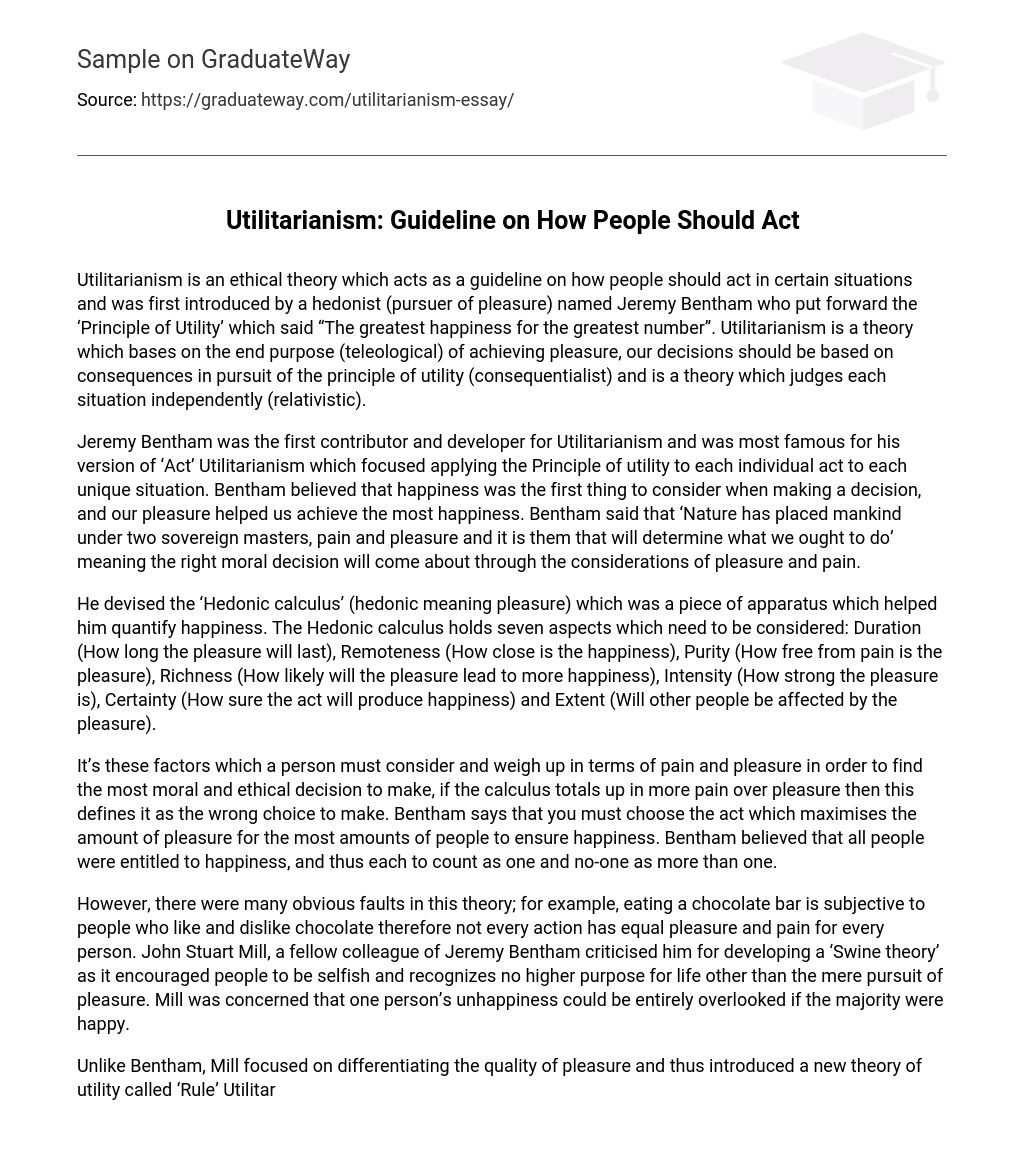Utilitarianism is an ethical theory that provides a framework for how people should behave in specific situations. It was originally proposed by Jeremy Bentham, a hedonist who valued pleasure. Bentham introduced the “Principle of Utility,” which states that the greatest happiness should be promoted for the largest number of people. Utilitarianism is a teleological theory focused on the ultimate goal of maximizing pleasure. It emphasizes that our decisions should be based on the consequences they produce, following the principle of utility. Additionally, utilitarianism is a relativistic theory, meaning that each situation is judged independently.
Jeremy Bentham was the pioneer and creator of Utilitarianism and is best known for his formulation of ‘Act’ Utilitarianism, which emphasizes the application of the Principle of utility to each specific action within different circumstances. Bentham posited that when making decisions, happiness should be prioritized, and our pleasure enables us to attain the greatest happiness. According to Bentham, “Nature has placed mankind under two sovereign masters, pain and pleasure, and it is these masters that will dictate our moral obligations,” signifying that moral correctness is determined by the assessment of pleasure and pain.
The ‘Hedonic calculus’ was developed by him as a method for quantifying happiness. It comprises of seven elements that need to be considered: Duration (the duration of pleasure), Remoteness (closeness of happiness), Purity (lack of pain accompanying pleasure), Richness (probability that pleasure leads to further happiness), Intensity (the intensity of pleasure), Certainty (likelihood that an action will result in happiness), and Extent (effect of pleasure on others).
When faced with a moral and ethical dilemma, it is crucial to take into account the factors of pain and pleasure. If the assessment reveals that there is a greater amount of pain than pleasure, this decision is deemed incorrect. Bentham believed that making the right choice entails maximizing pleasure for a larger number of individuals, thereby promoting overall happiness. Bentham emphasized the significance of guaranteeing equal opportunities for happiness among all people, regardless of their status or importance.
Despite the existence of several apparent flaws in this theory, such as the subjectivity of pleasure and pain in relation to individual preferences, it is worth noting the critique posed by John Stuart Mill. Mill criticized Jeremy Bentham for creating a theory that he deemed as promoting selfishness, often referred to as a ‘Swine theory’, which fails to acknowledge any higher meaning in life beyond the pursuit of pleasure. Mill raised concerns over the potential neglect of an individual’s unhappiness if the majority is content.
In contrast to Bentham, Mill placed emphasis on distinguishing the quality of pleasure and therefore proposed a new theory of utility known as “Rule” Utilitarianism. This theory served as a general principle that aimed to achieve happiness without discrimination. Mill’s concept of happiness leaned towards the spiritual and cultural aspects, rather than merely physical. He made a distinction between Higher and lower pleasures. Higher pleasures referred to activities that appealed to the mind, such as reading and poetry, while lower pleasures were associated with bodily needs like sex and eating.
According to Mill, the lower pleasures are easier to achieve and must be fulfilled before pursuing the intellectual needs of the mind. He famously said, “It is more preferable to be a satisfied human than a satisfied pig; it is better to be a dissatisfied Socrates than a satisfied fool.” This implies that humans are capable of experiencing more fulfilling emotions that surpass the feelings of pigs, even if they may feel dissatisfied. In modern times, two types of rule utilitarianism have been recognized: strong rule utilitarianism and weak rule utilitarianism.
Both strong and weak rule utilitarianism emphasize the application of a general rule to achieve happiness. However, strong rule utilitarianism considers the rule as absolute and unbreakable. An illustration of this is the rule of ‘Do not kill’ formulated based on the principle of utility. On the other hand, weak rule utilitarianism allows for certain rules to be broken as exceptions in order to achieve the greater good. For instance, the rule of ‘Do not kill’ could be disregarded if killing Hitler would prevent further pain.





